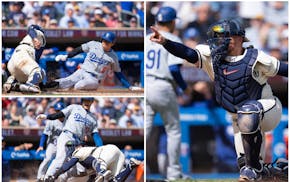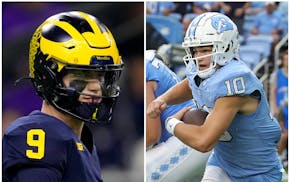Kain Colter finally belongs to a union. No, not that union, the one he hopes eventually brings about a sea change to college athletics.
He's seeking to keep his membership in a different union, the NFL players union. That's Colter's focus for now. History can wait. "It's all football right now," he said.
The former Northwestern quarterback finds himself at the bottom rung this weekend, an undrafted rookie free agent hoping to catch the eye of Vikings coaches and management. He has no massive platform here, just a few practices to convince the organization that he deserves a longer look.
Though his mission is strictly football, Colter's involvement in a landmark case involving the future of college athletics renders him more than just another anonymous long shot trying to get a foot in the NFL door.
Even a few of his fellow rookies at Winter Park this week recognized him for something other than his football talent.
"They're like, 'Hey, you're that union guy,' " Colter said.
Colter became the face of a movement by Northwestern football players to form a union based on the premise that high-level college athletes essentially are full-time employees. Colter once referred to the NCAA as a "dictatorship" and argued in favor of compensation and wider protections for athletes who generate a financial windfall for universities.
In March, a regional director of the National Labor Relations Board found that Northwestern football players qualify as employees and should be allowed to unionize. Pending legal appeals, the case could redefine college athletics.
The NCAA's amateurism model gradually has become viewed as archaic as a result of these large-scale conference networks pumping obscene amounts of revenue into college athletics. The idea that college athletes deserve some type of compensation beyond a scholarship no longer seems outrageous, even among conference administrators.
The union model, however, represents such a radical concept with unknown consequences and legal hurdles that it's difficult to view that as a practical option. Change is needed, but college athletes acting in a union seems too extreme.
"It's a real polarizing subject," Colter said.
His prominence in the debate made him a target of both praise and criticism. He's been cast as a pioneer and an ungrateful athlete who benefited from a scholarship to a prestigious university. He even shared his message with lawmakers in Washington, D.C.
"It's been a roller coaster, honestly," he said. "People can argue whether our method is the right method, but I think everybody agrees with the things that we're trying to get for these people."
Colter's involvement in the case stems, in part, from a class he took at Northwestern that focused on modern workplace issues, unions and the history of workers' rights.
Colter's parents discussed the potential ramifications with their son, but the attention that he received still caught them off guard.
"He felt real passionate about the issues and the causes that he was fighting for," said his father, Spencer. "I just didn't anticipate this thing blowing up quite like it did."
Spencer described his son's role in the case as a "side hobby" before correcting himself. "Actually, it's a big side hobby," he said. "I think in his heart he felt good about what he was doing. He knew he was coming from the right place. I'm amazed at how he's handled it with the poise and class that he's shown. It's really impressive. I'm really proud of him."
Colter said his role is "kind of over" now that his former teammates have voted on whether to unionize. The votes were sealed until after an appeal of the regional board's decision. A resolution could take years, depending on legal challenges.
"Obviously when you're looking to change the game and do something that's the first thing that's ever happened, it's going to be big news," Colter said.
For now, Colter's energy is focused solely on football. He mostly played quarterback in college but is attempting to earn a job as a receiver and returner. A nagging ankle injury required surgery in January, which hurt his draft preparation. He ran a slow time in the 40-yard dash at his pro day and went undrafted last weekend.
Colter faces tough odds to win a roster spot. He said he hasn't considered his next move if pro football doesn't work out. He majored in psychology. How about politics, since he's already had a little taste of it?
"Maybe," he said. "We'll see where life takes me. It's all football now."
Chip Scoggins chip.scoggins@startribune.com
Scoggins: Why 'championship or bust' fits these Wolves

Scoggins: Anatomy of a game-saving play as Correa throws out Ohtani

Scoggins: McCarthy or Maye? Ex-U coach breaks down Vikings' options
Scoggins: Cory Provus getting ready for 'biggest challenge' of career

